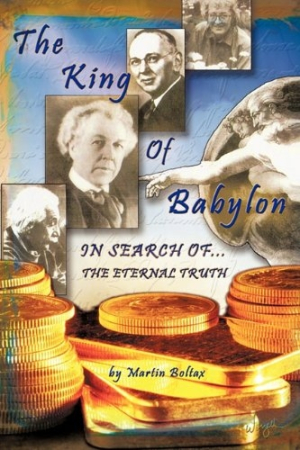The King of Babylon
Search of the Eternal Truth
Receiving an unexpected inheritance is a dream for many, but in Martin Boltax’s debut novel, The King of Babylon: Search of the Eternal Truth, inheritance can have dangerous consequences. The story opens with John Karras recounting how, as a down-and-out divorced man in New York City in the 1980s, he inherits a secret journal by a fictionalized Albert Einstein. The journal details a “Unified Grace Theory,” which combines a precise ritual between the “Spiritual Theory of Relativity” and the “Law of Ten Fold Returns.” With the help of a new love interest, John dutifully applies the Unified Grace Theory to amass a fortune, but does not quite get the results he intends.
To explain the Unified Grace Theory, the book features a sixty-page section of journal entries purportedly written by Einstein that detail mostly chance meetings with various people, including children, whom he befriends and with whom he shares his theory. The entries relate moving encounters between a renowned scientist and a mixture of famous and unknown individuals. As the book progresses, the people described in the journal are revealed to have all become influential in their respective fields. Everyone who reads the journal is encouraged to dedicate their life “to the service of mankind” and to ensure that “all who cross your path can lead a more abundant life for having met you.” These passages poignantly remind the reader to invest time and effort into others, to pursue dreams, to share life lessons, and to risk talking to strangers.
While Boltax’s novel is encouraging, entertaining, and easy to read, his premise is farfetched and oddly executed. Why does John Karras use the Unified Grace Theory to amass a fortune through investments, while others apply it to excel in fields from architecture to medicine? Why does Boltax choose to include two surprisingly explicit sexual encounters, while leaving the meaning of his book’s title somewhat obscure? Why is the story tied to Albert Einstein and a host of other famous, real-world individuals? Boltax’s novel attributes the accomplishments of famous people to magic and opens them all to charges of hoarding the power for their own glory rather than sharing the knowledge with others who could have benefited the world.
While only John Karras is guaranteed a tenfold monetary return by following the Unified Grace Theory, readers can certainly benefit from Boltax’s reminder that, by investing their time, skills, and money in the lives of others, they can receive a high return and leave a rich inheritance for future generations.
Reviewed by
William Gee
Disclosure: This article is not an endorsement, but a review. The publisher of this book provided free copies of the book and paid a small fee to have their book reviewed by a professional reviewer. Foreword Reviews and Clarion Reviews make no guarantee that the publisher will receive a positive review. Foreword Magazine, Inc. is disclosing this in accordance with the Federal Trade Commission’s 16 CFR, Part 255.

